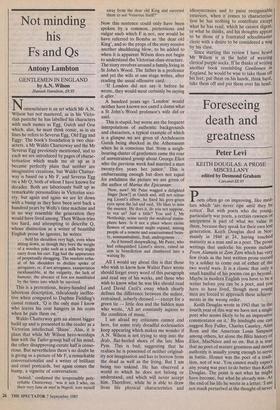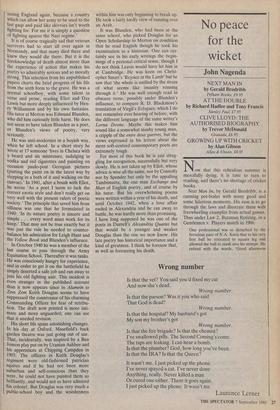Foreseeing death and greatness
Peter Levi
KEITH DOUGLAS: A PROSE MISCELLANY edited by Desmond Graham
Carcanet f8.95
Poets often go on improving, like mecl- • lars which 'are never ripe until they be rotten'. But with poets who die young, particularly war poets, a certain rawness or unripeness is part of what we value in them, because they speak for their own lost generation. Keith Douglas died in Nor- mandy in 1944 at 24, having touched maturity as a man and as a poet. The prose writings that underlie his poems include From Alamein to Zem Zem which has very few rivals as the best written prose record by a soldier to come out of either of the two world wars. It is a classic that only a small handful of his poems can go beyond. Maybe in modern English you have to be a writer before you can be a poet, and you have to have lived, though most young men are forced to approach these achieve- ments in the wrong order.
Keith Douglas wrote in 1943 that 'in the fourth year of this war we have not a single poet who seems likely to be an impressive commentator on it.' By hindsight one can suggest Roy Fuller, Charles Causley, Alan Ross and the American Louis Simpson among others, let alone the Blitz history of Eliot, MacNeice and so on. But it is true that no poet of mature greatness and moral authority is usually young enough to serve in battle. Homer was the poet of a tradi- tion, not of war. You cannot really expect any young war poet to do better than Keith Douglas. The point is not what he might have become, but what he already was. At the end of his life he wrote in a letter: '1 am not much perturbed at the thought of never seeing England again, because a country which can allow her army to be used to the last gasp and paid like skivvies isn't worth fighting for. For me it is simply a question of fighting against the Nazi regime.'
It is of course tragically sad that veteran survivors had to start all over again in Normandy, and that many died there and knew they would die there. But it is the foreknowledge of death almost more than the experience of action that makes his poetry so admirably serious and so morally strong. This selection from his unpublished papers charts the brief progress of his life from the sixth form to the grave. He was a normal schoolboy, with some talent in verse and prose, reading Eliot and Day Lewis but more deeply influenced by Hen- ry Williamson and by his own fantasies. His tutor at Merton was Edmund Blunden, who did him curiously little harm. He does not seem to have taken Blunden as a poet, or Blunden's views of poetry, very seriously.
He was anti-modernist in a boyish way, when he left school. In a short story he wrote at 17 someone 'lives in Chelsea with a beard and six mistresses, indulging in vodka and red cigarettes and painting on occasion paulo-post Georgian pictures (putting the paint on in the latest way by stepping in a bath of it and walking on the canvas).' In 1941, after a brush with Eliot, he wrote 'As a poet I seem to lack the correct exotic style and don't really get on very well with the present rulers of poetic society.' The principle that saved him from silliness was one that he formulated in 1940: 'In its nature poetry is sincere and simple . . . every word must work for its keep.' That may not be true exactly but it was just the rule he needed to counter- balance his admiration for Leigh Hunt and the Yellow Book and Blunden's influence.
In October 1940 he was a member of the last course to pass through the Army Equitation School. Thereafter it was tanks. He was consciously hungry for experience, and in order to get it on the battlefield he simply deserted a safe job and ran away to join his old fighting unit. This incident is even stranger in the published account than it now appears since in Alamein to Zem Zem Keith Douglas seems to have suppressed the connivance of his charming Commanding Officer for fear of retribu- tion. The draft now printed is more inti- mate and more unguarded; one can see that it needed revision.
His short life spans astonishing changes. In his day at Oxford, Masefield's back garden theatre was just going out of use. That, incidentally, was inspired by a Ben Jonson play put on by Uranian Ashbee and his apprentices at Chipping Campden in 1903. The officers in Keith Douglas's regiment were old-fashioned patrician squires and if he had not been more suburban and self-conscious than they were, he could not have painted them so brilliantly, and would not so have admired his colonel. But Douglas was very much a public-school boy and the woodenness within him was only beginning to break up. He took a fairly lordly view of running over an Arab.
It was Blunden, who had been at the same school, who picked Douglas for an Open Scholarship to Merton on condition that he read English though he took his examination as a historian. One can cer- tainly see in his early writings the begin- nings of a personal critical sense, though I do not think Leavis would have let him in at Cambridge. He was keen on Christ- opher Smart's 'Rejoice in the Lamb' but he saw that 'the whole is unified by the strain of what seems like insanity running through it.' He was well enough read in obscure verse, possibly under Blunden's influence, to compare R. D. Blackmore's translation of Virgil's Eclogues, which I do not remember ever hearing of before, with the different language of the same writer's Lorna Doone. Maybe this makes him sound like a somewhat mushy young man, a cripple of the entre deux guerres, but the views expressed in his letters about the more soft-centred contemporary poets are extremely tough. For most of this book he is just strug- gling for recognition, successfully but very slowly. He is not taken up by Eliot, whose advice is wise all the same, nor by Connolly nor by Spender but only by the appalling Tambimuttu, the one man Exchange and Mart of English poetry, and of course by his tutor. But his overwhelming poems were written within a year of his death, and until October 1942, when a love affair ended in Alexandria and he ran away to battle, he was hardly more than promising. I have long supposed he was one of the poets in Durrell's Alexandria Quartet but that would be a younger and weaker Douglas than the one we now know. His late poetry has historical importance and a kind of greatness. I think he foresaw that, as well as foreseeing his death.











































 Previous page
Previous page